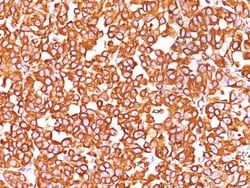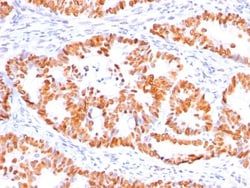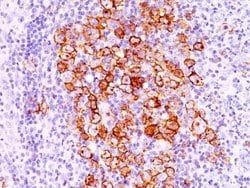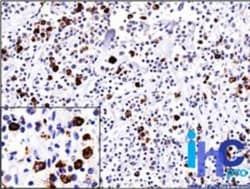ACTH Antibody (AH26), Novus Biologicals™
Manufacturer: Novus Biologicals
Select a Size
| Pack Size | SKU | Availability | Price |
|---|---|---|---|
| Each of 1 | NBP229452-Each-of-1 | In Stock | ₹ 45,078.50 |
NBP229452 - Each of 1
In Stock
Quantity
1
Base Price: ₹ 45,078.50
GST (18%): ₹ 8,114.13
Total Price: ₹ 53,192.63
Antigen
ACTH
Classification
Monoclonal
Concentration
0.2 mg/ml
Dilution
Flow Cytometry 0.5-1ug/million cells, ELISA, Immunocytochemistry/Immunofluorescence 1-2ug/ml, Immunohistochemistry-Paraffin 0.5-1.0ug/ml, Immunohistochemistry-Frozen 0.5-1.0ug/ml
Gene Alias
ACTH, adrenocorticotropic hormone, adrenocorticotropin, alpha-melanocyte-stimulating hormone, alpha-MSH, beta-endorphin, beta-LPH, beta-melanocyte-stimulating hormone, beta-MSH, CLIP, corticotropin-like intermediary peptide, corticotropin-lipotropin, gamma-LPH, gamma-MSH, lipotropin beta, lipotropin gamma, LPH, melanotropin alpha, melanotropin beta, melanotropin gamma, met-enkephalin, MSH, NPP, POC, pro-ACTH-endorphin, proopiomelanocortin, pro-opiomelanocortin, proopiomelanocortin preproprotein
Host Species
Mouse
Purification Method
Protein A or G purified
Regulatory Status
RUO
Primary or Secondary
Primary
Test Specificity
ACTH (same as Corticotropin) is a 39 amino acid active peptide produced by the anterior pituitary. This monoclonal antibody is specific to Synacthen (aa1-24 of ACTH); does not react with CLIP (aa17-39 of ACTH). POMC (pro-opiomelanocortin or corticotropin-lipotropin) is a 267 amino acid polypeptide hormone precursor that goes through extensive, tissue-specific posttranslational processing by convertases. POMC is cleaved into ten hormone chains named NPP, ACTH, alpha-MSH (Melanocyte Stimulating Hormone), beta-MSH, gamma-MSH, CLIP (corticotropin-like intermediary peptide), Lipotropin-beta, Lipotropin-gamma, beta-endorphin and Met-enkephalin. ACTH is also produced by cells of immune system (T-cells, B-cells, and macrophages) in response to stimuli associated with stress. Anti-ACTH is a useful marker in classification of pituitary tumors and the study of pituitary disease. It reacts with ACTH-producing cells (corticotrophs).It also may react with other tumors (e.g. some small cell carcinoma
Content And Storage
Store at 4C.
Isotype
IgG1 κ
Applications
Flow Cytometry, ELISA, Immunocytochemistry, Immunofluorescence, Immunohistochemistry (Paraffin), Immunohistochemistry (Frozen)
Clone
AH26
Conjugate
Unconjugated
Gene Accession No.
P01189
Gene Symbols
POMC
Immunogen
Synthetic peptide corresponding to aa1-24 of human ACTH (Uniprot: P01189)
Quantity
0.1 mg
Research Discipline
Neuroscience, Nutrient Sensing in the Brain
Gene ID (Entrez)
5443
Target Species
Human, Mouse, Rat
Form
Purified
Related Products
Description
- ACTH Monoclonal specifically detects ACTH in Human, Mouse, Rat samples
- It is validated for ELISA, Immunohistochemistry, Immunohistochemistry-Paraffin.









